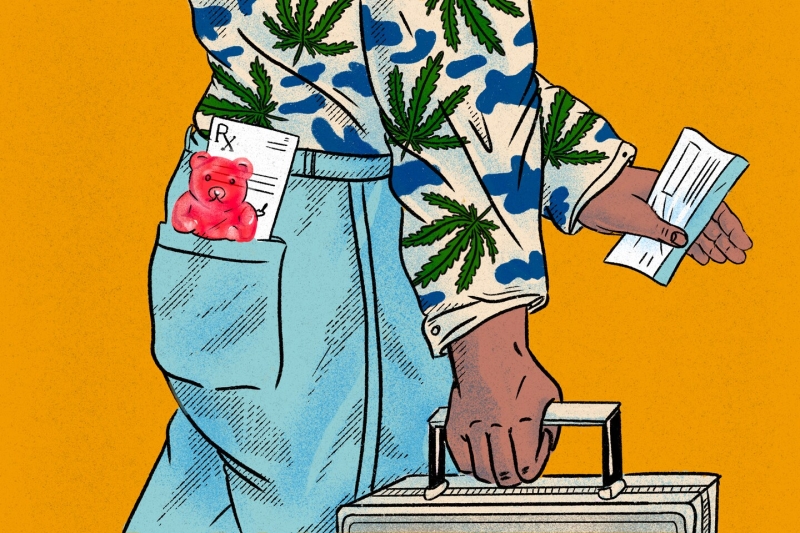A medical marijuana patient asks our travel advice columnist about bringing edibles to the airport.
Traveling has always come with complications. Our By The Way Concierge column will take your travel dilemmas to the experts to help you navigate the new normal. Want to see your question answered? Submit it here.
My husband and I carry THC edibles for chronic pain in our knees and back (all military related). Can I bring my medication in a gummy form to the airport and not be arrested for possession? — Anonymous
Even if your weed gummies are legal in your state, they’re technically illegal to bring on a plane. Does that mean you’d get arrested at the airport for having them in your luggage? Probably not.
Air travel in the United States falls under federal jurisdiction, so airports and airplanes follow federal marijuana law. According to that law, having any marijuana products (gummies, mints, tinctures, etc.) that contain more than 0.3 percent THC on a dry-weight basis is illegal, so you can’t fly with any.
“Even if it’s for medical purposes, it’s still federally illegal,” said John McGowan, a managing partner at Kinner & McGowan, a cannabis law firm in Washington, D.C.
Anything less than 0.3 percent THC is considered hemp, so on the off chance that your weed gummies are really more like CBD gummies with an extremely low dose of THC, you’d be allowed to pack them to fly.
However, airport security isn’t designed to hunt down your weed gummies.
According to Transportation Security Administration spokesperson Lisa Farbstein, TSA officers are trained to detect potential threats to aviation; they don’t look for illegal drugs.
If a TSA officer happens to come across some in the screening process, they may confiscate it, ask the traveler to throw it away in a cannabis amnesty box or refer the matter to law enforcement officers. The risk of the last is higher if the officer discovers large amounts of marijuana, you’re in a state where weed is illegal, or the weed discovery is “coupled with something else,” McGowan said.
For example, law enforcement may be called because you had cannabis and a large amount of cash, or cannabis and a bunch of bullets in your bag.
Mikhail Kogan, co-author of the book “Medical Marijuana” and medical director of the GW Center for Integrative Medicine, says he’s had a few patients tell him they’ve been stopped for their medical marijuana products at the airport, but not because of their THC content. Instead, they were flagged because they were in liquid form in a size that exceeded TSA’s limit for carry-on liquids. Kogan has yet to have a patient stopped for carrying weed gummies.
International travel is a different story. Kogan says your risks go up exponentially if you try to take cannabis overseas. “We know how that will turn out for you,” he said, referring to the case of American basketball player Brittney Griner, who was caught traveling to Russia with small amounts of cannabis oil and imprisoned for more than nine months.
In the rare case that you were arrested for having some edibles at a U.S. airport, “as a practical matter, prosecutors have far more important things to do than prosecute people for carrying gummies onto planes,” Washington aviation attorney Mark Lindquist said in an email. “These cases are generally not pursued.”
He continued: “That said, while you’re highly unlikely to be arrested and prosecuted for gummies, bringing an illegal substance onto a plane could still turn into a serious hassle and bummer.”
That could all change if the United States reclassifies marijuana as a lower-risk drug, as Attorney General Merrick Garland has recently recommended. The move would mean cannabis would be treated more like a prescription drug like codeine, Kogan said. But he doesn’t expect reclassification to happen anytime soon.
“Your guess is as good as mine,” he said.
In the meantime, your gummies are forbidden on planes. So is being really high at the airport — so don’t overdo it on a last-minute dose before your trip.
“It should be noted that under Section 121.575 of the Federal Aviation Regulations, the airline should not allow a person to board ‘if that person appears intoxicated,’” Lindquist said. “Usually this means drunk, but it also means stoned.”
Have a travel dilemma for By The Way Concierge? Send it to us here.
More travel tips
Vacation planning: Start with a strategy to maximize days off by taking PTO around holidays. Experts recommend taking multiple short trips for peak happiness. Want to take an ambitious trip? Here are 12 destinations to try this year — without crowds.
Cheap flights: Follow our best advice for scoring low airfare, including setting flight price alerts and subscribing to deal newsletters. If you’re set on an expensive getaway, here’s a plan to save up without straining your credit limit.
Airport chaos: We’ve got advice for every scenario, from canceled flights to lost luggage. Stuck at the rental car counter? These tips can speed up the process. And following these 52 rules of flying should make the experience better for everyone.
Expert advice: Our By The Way Concierge solves readers’ dilemmas, including whether it’s okay to ditch a partner at security, or what happens if you get caught flying with weed. Submit your question here. Or you could look to the gurus: Lonely Planet and Rick Steves.

